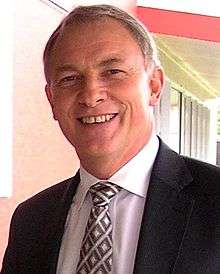New Zealand Labour Party leadership election, 1996
| | |||||||||||||||||||
| |||||||||||||||||||
| |||||||||||||||||||
| |||||||||||||||||||
The New Zealand Labour Party leadership election, 1996 was intended to determine the future leadership of the New Zealand Labour Party. The leadership was retained by Mount Albert MP Helen Clark, who was the incumbent leader.
Background
Labour were down in opinion polls with the Alliance party being seen as an increasing threat to Labour as the main left wing party in New Zealand. Labour was still associated with its Rogernomics image from the 1980s, which Clark was attempting to erase.[1] However this was part of a wider divide inside Labour between its drastically differing left and right factions. Clark was of the left-leaning faction, attempting to restore Labour to it social democratic roots, while those on the right-wing of Labour (such as Goff) were intent on retaining the deregulation and free trade policies of the 1980s, albeit more moderately.[2]
Candidates
Helen Clark
Clark had led Labour for nearly three years since her own leadership challenge in 1993 against Mike Moore.[3] She was relatively unpopular in the country at the time, however she was seen as a colossus within the Labour party itself by Goff and his allies. Clark had yet to connect with voters seeming aloof. Her widely acknowledged intelligence came across more as arrogance than aptitude.[2]
Phil Goff
Goff had been a cabinet minister for the entirety of the Fourth Labour Government, actually having more cabinet experience than Clark, who only became a minister in 1987. He was currently serving as the Shadow Minister of Justice under Clark. However, Goff was largely unknown, a dangerous factor only months from an election coupled with his hardline reputation as a Rogernomics-era Minister, an image Labour was trying to shake. This caused many fence sitters to remain with the status-quo.[2]
Mike Moore
After losing the leadership to Clark, Moore had strongly considered forming a break-away party, the New Zealand Democratic Coalition with Geoff Braybrooke for the new MMP era, but then decided against it. A couple of Maori MPs told Goff's lieutenants they were willing to vote against Clark, but for Moore rather than Goff.[2]
Result
A delegation of Goff and Labour frontbenchers Annette King, Michael Cullen, Jim Sutton and Koro Wētere met with Clark in her office prior to a caucus meeting persuading her to stand down and informing her (in a ruse) that they had the numbers to oust her if she refused.[2] Clark had been prepared for it and had already mobilised her own allies, her deputy David Caygill, Trevor Mallard, Steve Maharey and whip Jonathan Hunt. They had assured her that there were enough MPs loyal to her that the challenge could be averted.[4] Clark stared Goff and his supporters down and ultimately remained leader.[2]
Aftermath
Clark would lead Labour until she resigned in 2008. Clark was advised by her allies to demote Goff, but she chose not to. As feared, Labour lost the 1996 election, but would then win three consecutively (Labour's best showing since their first government) in 1999, 2002 and 2005. Goff would eventually become leader in 2008 when Clark resigned following that year's election.
Notes
- ↑ Edwards 2001, p. 247-8.
- 1 2 3 4 5 6 Quin, Phil (2 April 2011). "Phil Quin: The anatomy of a failed Labour coup". The New Zealand Herald. Retrieved 15 May 2016.
- ↑ Edwards 2001, p. 228-9.
- ↑ Edwards 2001, p. 247.
References
- Edwards, Brian (2001). Helen: Portrait of A Prime Minister. Auckland: Exisle Publishing. ISBN 0-908988-20-6.


